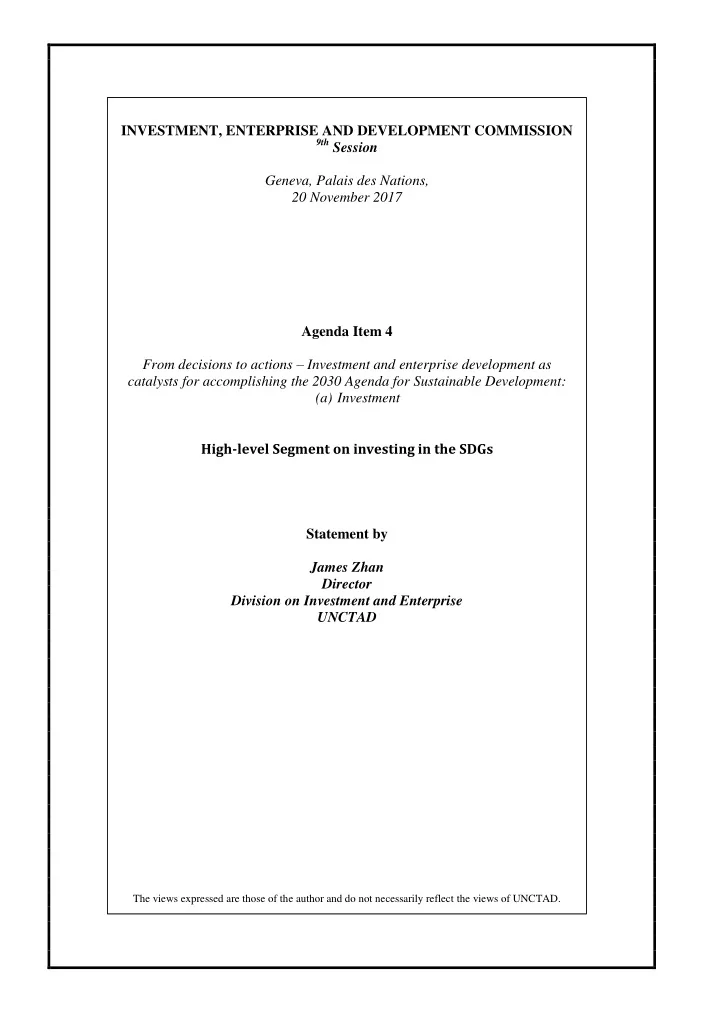

INVESTMENT, ENTERPRISE AND DEVELOPMENT COMMISSION 9th Session Geneva, Palais des Nations, 20 November 2017 Agenda Item 4 From decisions to actions – Investment and enterprise development as catalysts for accomplishing the 2030 Agenda for Sustainable Development: (a) Investment High-level Segment on investing in the SDGs Statement by James Zhan Director Division on Investment and Enterprise UNCTAD The views expressed are those of the author and do not necessarily reflect the views of UNCTAD.
Excellencies, Distinguished participants, Ladies and Gentlemen, I am pleased to welcome you to this high-level segment of the ninth session of the Investment, Enterprise, and Development Commission. Building on the theme of UNCTAD 14, “From Decisions to Actions,” this meeting will focus on policy options, investment promotion strategies, best practice, and practical tools to mobilize investment to accomplish the 2030 Agenda for Sustainable Development. We are fortunate to have a very distinguished panel of speakers. I also look forward to interventions from delegates, executives from inward and outward investment promotion agencies, and from private sector representatives and other stakeholders. Ladies and Gentlemen, It has now been a little over two years since United Nations Member States adopted the 2030 Agenda for Sustainable Development to address multiple global social, economic, and environmental challenges. Meeting these challenges over the next 13 years will require a formidable investment push. As UNCTAD has mentioned before, developing countries alone face an annual gap of US$2.5 trillion between current levels of investment and the actual scope of investment required to achieve the SDGs. Therefore, private sector investment, including foreign direct investment, should be mobilized for SDG-related projects in areas such as power generation and electricity supply, infrastructure, water and sanitation, as well as food security, climate change mitigation and adaptation, and health and education. FDI is the largest source of external finance for developing countries. In addition, FDI has the potential to create higher-skilled employment, facilitate the diffusion of technology, and improve access to international markets. To steer investment towards SDG outcomes, governments should create a favourable and enabling investment environment and, where possible, provide appropriate levels of access for private investors to SDG-related sectors. Along with government policies to enable and incentivise investment in SDG projects, the targeted promotion and facilitation of these projects require a strategic approach and specialized institutions. Investment promotion agencies (or IPA) are well positioned to play this role. UNCTAD’s action plan for investing in the SDGs was published in the World Investment Report 2014 and contains recommendations to achieve this objective. Some of these recommendations proposed that IPAs should: 1. introduce new investment promotion strategies, 2. focus on the preparation and marketing of pipelines of bankable SDG-related projects, and 3. develop new partnerships. Let me expand on these recommendations, starting with new investment promotion strategies. To reorient investment promotion and facilitation efforts on SDG objectives, will require the development of a new generation of investment promotion strategies. Such strategies should start by mainstreaming SDGs and identifying target sectors to determine the orientation of SDG- related investment project promotion. This entails research and interaction with a wide range of stakeholders, including ministries, relevant government agencies, and private sector organizations. 2
Second, SDG projects need to be ranked as priorities, and pipelines of SDG project proposals should be developed accordingly. The strategies should be accompanied by sound action plans to market projects and identify suitable project partners. Follow-up and aftercare are important requisites to bring projects to fruition. Third, a partnership approach will provide an important bolster when pursuing new promotion strategies. New partnerships can take many forms and different stakeholders should be engaged at different levels. Outward investment agencies – or OIAs – in particular, can play a vital auxiliary role in supporting and financing Goals-oriented investment. Many of these institutions already offer and administer special programmes and schemes in support of SDG- related projects in developing countries. Cooperation between OIAs in home countries and IPAs in host countries may be beneficial for both, and should be encouraged. Furthermore, it is imperative to keep all stakeholders informed at all stages of project development, execution and wrap-up. Feedback from stakeholders can be an important indication for whether projects could be successfully pursued. These actions will help ensure successful execution, which, in turn, will lay the foundation for the successful future mobilization of investment, primed to achieve maximum impact on sustainable development. The high-level segment today is to explore these areas in more detail. In particular, through the presentations and discussions, we should consider some of the key challenges faced by governments and IPAs in pursuit of SDG-related investment. These challenges, among others, include: how to stimulate the private sector to invest in SDGs-related projects, and how to better monitor the impact of investment on the SDGs. I hope this meeting will also give UNCTAD more guidance on the types of technical assistance best suited to support developing countries — in particular least developed countries — in attracting investment in SDG sectors. UNCTAD is already undertaking a number of activities to support IPAs, governments, and other stakeholders to mobilize investment in the SDGs. These include regional seminars to assist IPAs in developing pipelines of bankable SDG projects and in partnering with OIAs. We have already conducted regional seminars in South Africa and Mexico. Another seminar will be held for IPAs in Asia and the Pacific in the first half of next year. Your feedback on the efficacy of these programmes is welcome. We also encourage IPAs to reorient their investment promotion programmes towards the SDGs by awarding leading IPAs whose work stimulate investment in the SDGs. In this context, I have the pleasure to invite you to join us at the Delegates Restaurant immediately after this meeting, for the ceremony of the 2017 United Nations Awards for Promoting Investment in the SDGs. We will recognize three IPAs and OIAs for their exceptional achievements in promoting and facilitating investment that contributes to the SDGs. I hope to see you all there. Thank you. 3
Recommend
More recommend